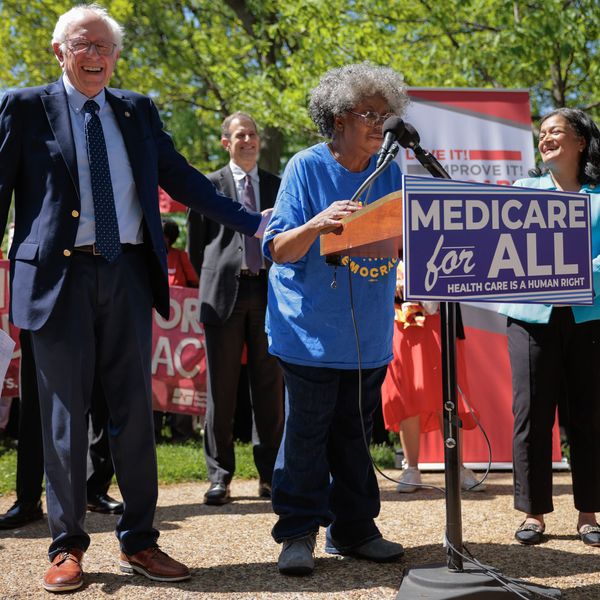With Real Health Care Reform, US Would Not Need Affordability Tax Credits
Our health care system is unbelievably more expensive than any other first world nation. On a per capita basis, we spend over 50% more on health care than the second most expensive nation, Norway. As a nation, we spend more than twice as much per capita on health care than first world countries like Germany, Denmark, Belgium, France, Sweden, the UK, or Australia. If we actually got real health care reform that brought our health care costs down closer to the rest of the industrialized world, their would be no need to grant affordability tax credits on the new exchange.
In 2016, the Senate bill will spend $76 billion on affordability tax credits in the new exchange. The CBO says in 2016,
The majority of nongroup enrollees (about 57 percent) would receive subsidies via the new insurance exchanges, and those subsidies, on average, would cover nearly two-thirds of the total premium
Using this data, I can estimate that roughly $210 billion will be spent on premiums in the non-group market in 2016. Of that $210 billion, about 36% ($76 billion) will by paid for by the government in the form of tax credits, and about 64% ($134 billion) will be paid directly by individuals.
If we had a health care system as cost effective as Germany, Denmark, or France, that $134 billion paid by individuals would be more than enough to cover everyone in the non-group market with several billion left over. If we could truly reform our broken health care system and bring its costs in line with the rest of the industrialized world, there would be no need for large government tax credits on the exchange. Think about that for a moment. Even with the government picking up about 36% of the cost, individuals in the new exchanges would still be dramatically overpaying for health insurance compared to the rest of the world.
What this bill does is expand something called "coverage" and adds some new regulations to insures. It is not real health care reform. Because Obama cut sweetheart deals with the hospitals, doctors, and drug companies, true cost-controlling reform became impossible.
Some supporters of the Senate bill have pointed to all the money going to middle class families to help them afford insurance as a great thing. The help is nice, but it only points to how terrible the underlying problem really is. It is simply a strategy of throwing good money after bad. Middle class families should not need government subsidies to afford health insurance. What middle class American families really need is for our government to rein in the different industries ruining our health care system, not pass a bill that will only enrich and empower them further.
An Urgent Message From Our Co-Founder
Dear Common Dreams reader, The U.S. is on a fast track to authoritarianism like nothing I've ever seen. Meanwhile, corporate news outlets are utterly capitulating to Trump, twisting their coverage to avoid drawing his ire while lining up to stuff cash in his pockets. That's why I believe that Common Dreams is doing the best and most consequential reporting that we've ever done. Our small but mighty team is a progressive reporting powerhouse, covering the news every day that the corporate media never will. Our mission has always been simple: To inform. To inspire. And to ignite change for the common good. Now here's the key piece that I want all our readers to understand: None of this would be possible without your financial support. That's not just some fundraising cliche. It's the absolute and literal truth. We don't accept corporate advertising and never will. We don't have a paywall because we don't think people should be blocked from critical news based on their ability to pay. Everything we do is funded by the donations of readers like you. Will you donate now to help power the nonprofit, independent reporting of Common Dreams? Thank you for being a vital member of our community. Together, we can keep independent journalism alive when it’s needed most. - Craig Brown, Co-founder |
Our health care system is unbelievably more expensive than any other first world nation. On a per capita basis, we spend over 50% more on health care than the second most expensive nation, Norway. As a nation, we spend more than twice as much per capita on health care than first world countries like Germany, Denmark, Belgium, France, Sweden, the UK, or Australia. If we actually got real health care reform that brought our health care costs down closer to the rest of the industrialized world, their would be no need to grant affordability tax credits on the new exchange.
In 2016, the Senate bill will spend $76 billion on affordability tax credits in the new exchange. The CBO says in 2016,
The majority of nongroup enrollees (about 57 percent) would receive subsidies via the new insurance exchanges, and those subsidies, on average, would cover nearly two-thirds of the total premium
Using this data, I can estimate that roughly $210 billion will be spent on premiums in the non-group market in 2016. Of that $210 billion, about 36% ($76 billion) will by paid for by the government in the form of tax credits, and about 64% ($134 billion) will be paid directly by individuals.
If we had a health care system as cost effective as Germany, Denmark, or France, that $134 billion paid by individuals would be more than enough to cover everyone in the non-group market with several billion left over. If we could truly reform our broken health care system and bring its costs in line with the rest of the industrialized world, there would be no need for large government tax credits on the exchange. Think about that for a moment. Even with the government picking up about 36% of the cost, individuals in the new exchanges would still be dramatically overpaying for health insurance compared to the rest of the world.
What this bill does is expand something called "coverage" and adds some new regulations to insures. It is not real health care reform. Because Obama cut sweetheart deals with the hospitals, doctors, and drug companies, true cost-controlling reform became impossible.
Some supporters of the Senate bill have pointed to all the money going to middle class families to help them afford insurance as a great thing. The help is nice, but it only points to how terrible the underlying problem really is. It is simply a strategy of throwing good money after bad. Middle class families should not need government subsidies to afford health insurance. What middle class American families really need is for our government to rein in the different industries ruining our health care system, not pass a bill that will only enrich and empower them further.
Our health care system is unbelievably more expensive than any other first world nation. On a per capita basis, we spend over 50% more on health care than the second most expensive nation, Norway. As a nation, we spend more than twice as much per capita on health care than first world countries like Germany, Denmark, Belgium, France, Sweden, the UK, or Australia. If we actually got real health care reform that brought our health care costs down closer to the rest of the industrialized world, their would be no need to grant affordability tax credits on the new exchange.
In 2016, the Senate bill will spend $76 billion on affordability tax credits in the new exchange. The CBO says in 2016,
The majority of nongroup enrollees (about 57 percent) would receive subsidies via the new insurance exchanges, and those subsidies, on average, would cover nearly two-thirds of the total premium
Using this data, I can estimate that roughly $210 billion will be spent on premiums in the non-group market in 2016. Of that $210 billion, about 36% ($76 billion) will by paid for by the government in the form of tax credits, and about 64% ($134 billion) will be paid directly by individuals.
If we had a health care system as cost effective as Germany, Denmark, or France, that $134 billion paid by individuals would be more than enough to cover everyone in the non-group market with several billion left over. If we could truly reform our broken health care system and bring its costs in line with the rest of the industrialized world, there would be no need for large government tax credits on the exchange. Think about that for a moment. Even with the government picking up about 36% of the cost, individuals in the new exchanges would still be dramatically overpaying for health insurance compared to the rest of the world.
What this bill does is expand something called "coverage" and adds some new regulations to insures. It is not real health care reform. Because Obama cut sweetheart deals with the hospitals, doctors, and drug companies, true cost-controlling reform became impossible.
Some supporters of the Senate bill have pointed to all the money going to middle class families to help them afford insurance as a great thing. The help is nice, but it only points to how terrible the underlying problem really is. It is simply a strategy of throwing good money after bad. Middle class families should not need government subsidies to afford health insurance. What middle class American families really need is for our government to rein in the different industries ruining our health care system, not pass a bill that will only enrich and empower them further.

